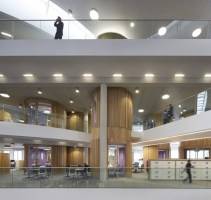November 5, 2014
Failure to adopt strategic facilities management costs UK £1bn annually
 A new report from the Royal Institution of Chartered Surveyors (RICS) claims that over a quarter of UK organisations are failing to adopt a strategic approach to facilities management. For those firms without this approach, the annual average cost is calculated by the report’s authors as £120,000, suggesting a total cost to the economy of nearly £1 billion. The claim is based on a study of around 700 organisations in both the public and private sector and across a range of organisational types and sizes. Around half of those with a ‘dedicated FM programme’ said that doing so had saved their organisation money, 59 per cent reported an increase in productivity, a fifth (21 percent)reported a drop in absenteeism and nearly half (49 percent) claimed it had made them more attractive to customers. The best results were recorded in the public sector with 70 per cent saying strategic facilities management had increased productivity and 71 percent claiming they had seen an increase in employee engagement.
A new report from the Royal Institution of Chartered Surveyors (RICS) claims that over a quarter of UK organisations are failing to adopt a strategic approach to facilities management. For those firms without this approach, the annual average cost is calculated by the report’s authors as £120,000, suggesting a total cost to the economy of nearly £1 billion. The claim is based on a study of around 700 organisations in both the public and private sector and across a range of organisational types and sizes. Around half of those with a ‘dedicated FM programme’ said that doing so had saved their organisation money, 59 per cent reported an increase in productivity, a fifth (21 percent)reported a drop in absenteeism and nearly half (49 percent) claimed it had made them more attractive to customers. The best results were recorded in the public sector with 70 per cent saying strategic facilities management had increased productivity and 71 percent claiming they had seen an increase in employee engagement.























October 6, 2014
A feeling of togetherness is essential and motivating, so why would we kill off the office?
by Mark Eltringham • Comment, Facilities management, Flexible working, Knowledge, Workplace design
It is still depressingly commonplace to read proclamations of the death of the office. These are usually appended to some survey or other about the rise of flexible working or a case study of a workplace devoid of desks (or, more likely, one in which none are pictured). Of course, the actual conclusion we can draw from such things is that the office as we once knew it is now dead or mutating into something else, but that’s true for every aspect of modern life. The constant factor that ensures offices will always exist, in some form or other is the human they serve. We know that because, as Tom Allen proved at MIT in the 1980s, people communicate less well the greater the physical distance between them. Now new research from Stanford University shows how the very idea of ‘togetherness’ can have a significant impact on the way people perform. The study, by researchers Priyanka Carr and Gregory Walton was published in the Journal of Experimental Social Psychology and concluded that ‘social cues that signal an invitation to work with others can fuel intrinsic motivation’.
More →